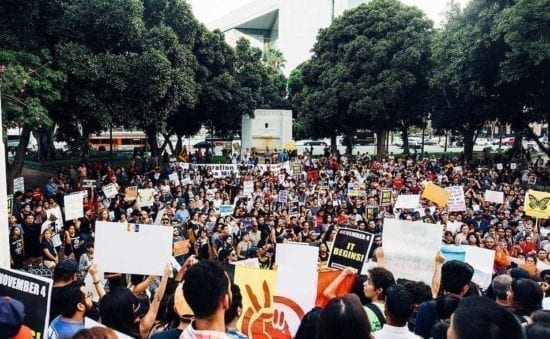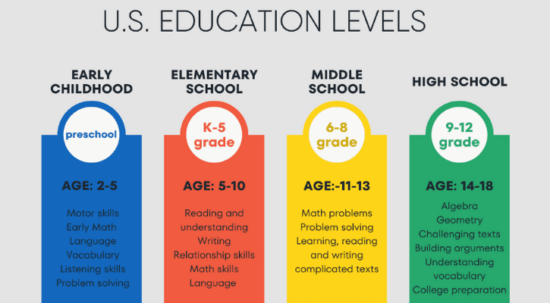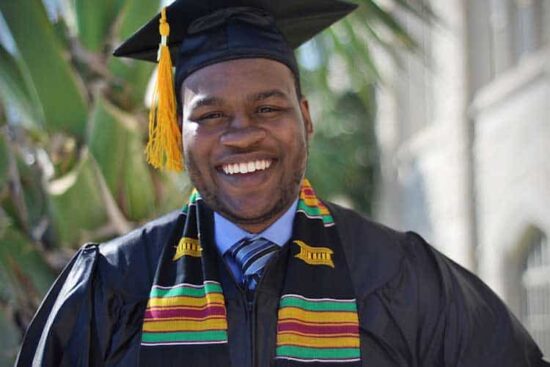Федеральні закони та закони штатів про освіту
Федеральні закони та закони штатів захищають права учнів у державних школах по всій території США. Хоча вони здебільшого стосуються початкової, середньої та старшої школи, деякі федеральні закони також поширюються на коледжі та університети, особливо щодо рівних можливостей для студентів усіх статей та студентів з інвалідністю.
Закони штатів різняться. Кожна держава встановлює власні правила щодо того, що вивчають учні, хто може викладати і як фінансуються школи.
Право на державну освіту
Всі діти мають право на безкоштовну державну освіту та отримання атестату про середню освіту в будь-якій точці Сполучених Штатів. Кожен має право відвідувати державні школи, незалежно від імміграційного статусу.
Право на державну освіту також пов'язане з певними вимогами:
- Батьки та опікуни несуть відповідальність за зарахування своїх дітей до державних або приватних шкіл.
- Всі діти повинні відвідувати школу на певну кількість років. У більшості штатів діти віком від 5 до 16 років зобов'язані відвідувати школу.
- Закони штату встановлюють вимоги щодо того, коли учні можуть кинути школу. У більшості випадків учні повинні бути не молодше 16 років і мати дозвіл на припинення відвідування школи.
| Право на освіту, незалежно від імміграційного статусу, не поширюється на студентів, які вступають до коледжу або університету. Не існує законів, які забороняють DACA або нелегальним студентам відвідувати коледж, але деякі навчальні заклади можуть відмовити у вступі. Дізнайтеся більше. |
Право на рівні можливості
Усі державні та місцеві школи зобов'язані надавати учням рівний доступ до державної освіти.
- Федеральний закон вимагає від шкіл надавати учням рівні шанси на успіх у навчанні , незалежно від їхньої раси, етнічної приналежності, кольору шкіри, національного походження, віросповідання, статі, імміграційного статусу чи сімейного доходу.
- Школи повинні надавати однакові можливості для всіх учнів щодо занять, шкільних заходів, спорту, фінансової допомоги, медичного обслуговування та працевлаштування.
- Школи повинні вносити обґрунтовані зміни в класи та заходи, щоб пристосувати їх до учнів з різними потребами. До них відносяться мовні навички, інвалідність, гендерна ідентичність та релігія.
- Студенти з інвалідністю мають право на спеціальну освіту та пов'язані з нею послуги. Це може включати фізичну терапію, логопедичну допомогу, перекладача жестової мови, нотатника, читачів, спеціальне комп'ютерне обладнання та додатковий час для проходження тесту.
- Батьки можуть оскаржити розміщення своєї дитини на певних програмах або рівнях навчання.
Підтримка англійської мови
Студенти, які не володіють англійською мовою, мають право на безкоштовну мовну допомогу. Усі державні школи зобов'язані виявляти учнів, які потребують мовної підтримки. Студенти, які вивчають англійську мову, можуть записатися на курси англійської мови та отримати двомовні ресурси. Батьки також можуть попросити перекладача або перекладені матеріали.
Захист від дискримінації
Дискримінація - це несправедливе ставлення до людей на основі їхніх фактичних або уявних характеристик. Це може відбуватися в багатьох сферах освіти, зокрема:
- Прийом та зарахування на навчання
- Завдання та заходи
- Фінансова допомога
- Дисципліна
Дискримінація може набувати різних форм. Це може включати в себе:
- Обзивання та образи
- Словесні погрози або фізична шкода
- Виключення з діяльності
- Нерівне ставлення до студентів
Усі державні школи, коледжі та університети не можуть дискримінувати учнів, батьків та опікунів, працівників та абітурієнтів на підставі їхньої релігійної приналежності:
- Раса, колір шкіри, національне походження, етнічна приналежність або походження
- Знання мови
- Стать, сексуальна орієнтація та гендерна ідентичність
- Інвалідність (фізичні або психічні порушення)
- Вагітність, сімейний стан або наявність дітей
- Імміграційний статус
- Економічний статус
- Житлова ситуація
- Релігія
- Вік
Вчителі, адміністратори та учні не можуть обирати, переслідувати або профілювати певні групи людей на основі цих характеристик.
Усі школи повинні надавати доступ до державної освіти учням, які є без постійного місця проживання. Учні, які не мають постійного місця проживання, можуть бути зараховані до школи, навіть якщо вони не можуть надати необхідні документи, такі як підтвердження місця проживання.
Усі державні школи зобов'язані розслідувати випадки дискримінації та вживати заходів для її припинення, усунення наслідків і запобігання повторенню.
Право на свободу вираження поглядів
Всі учні мають право на самовираження в школі , якщо це не порушує шкільну політику і не заважає шкільним заходам. Це включає в себе говоріння, письмо або вираження себе за допомогою символічних повідомлень.
Учні мають право висловлювати свою віру та сповідувати її в школі. Учні можуть спостерігати за релігійною діяльністю, такою як молитва в школі, у ненав'язливому середовищі. Студенти можуть вільно говорити на релігійні теми. Школи повинні відпускати учнів з уроків для святкування релігійних свят.
Дрес-код державної школи не може перешкоджати учням висловлювати свої переконання. Студенти мають право носити релігійний одяг, зокрема хустки, тюрбани та ярмулки. Студенти можуть носити одяг, який відповідає їхній гендерній ідентичності. Політика шкільного дрес-коду може забороняти певний одяг, лише якщо він вважається деструктивним або відволікаючим.
Державні школи не можуть пропагувати релігійні вірування чи практики, в тому числі молитви в школі чи на шкільних заходах.
Студенти мають право зберігати мовчання і сидіти під час складання Присяги на вірність.
Право на недоторканність приватного життя
Усі учні мають право на приватність у школі та поза нею.
Школи не можуть:
- Запитайте про імміграційний статус студента, , зокрема про місце народження, свідоцтво про народження чи номер соціального страхування.
- Розкривати особисту інформацію учнів стороннім особам без дозволу учня або його батьків чи опікунів.
- Розголошувати документи про освіту студентів без дозволу батьків або опікунів студентів.
- Надавати інформацію про учнів представникам ICE без згоди або ордеру.
Працівники школи та поліція можуть обшукувати шкільне майно, включаючи учнівські шафки та парти , якщо вони мають обґрунтовану підозру, що учень порушив правила. Однак, шкільний персонал і поліція не можуть обшукувати особисті речі учнів, включаючи рюкзаки і телефони, без дозволу учня або ордеру на обшук.
Поліція та ICE в школі
Студенти мають особливі права у відносинах з поліцією та імміграційними.
У школах, які вважаються чутливими об'єктами, заборонено проведення імміграційно-митних перевірок (ICE). Сюди входять дошкільні заклади, початкові школи, середні школи, коледжі та університети, а також інші навчальні заклади. ICE та CBP, як правило, не мають права заарештовувати, опитувати, обшукувати або стежити за іммігрантами в школі, на зупинці шкільного автобуса або під час шкільних заходів.
Адміністрація школи не може допомагати співробітникам імміграційної служби вилучати учнів-іммігрантів, у тому числі з нелегальним статусом, зі школи. Школи не повинні допускати проведення імміграційних перевірок у школах без судового ордеру, підписаного суддею. У разі затримання учня імміграційною службою шкільний округ повинен негайно повідомити про це батьків або опікунів учня.
Шкільна поліція може зупиняти, допитувати та обшукувати учнів у школі, якщо підозрює, що вони порушують будь-які закони або шкільні правила. Вони мають право зберігати мовчання і не повинні відповідати на будь-які запитання без попередньої розмови з батьками, опікуном або адвокатом.
Шкільна поліція не може застосовувати надмірну силу проти учнів.
Шкільна поліція не може обшукувати учня, його рюкзак, телефон чи інше майно без дозволу або ордера. Однак вони можуть обшукувати шафки або шкільне майно, якщо мають обґрунтовану підозру, що є нижчим стандартом, ніж достатня підстава, необхідна для правоохоронних органів за межами школи.
Шкільна поліція може заарештувати учня, якщо має докази того, що він скоїв злочин. Якщо вашу дитину затримали або заарештували, переконайтеся, що вона знає, що може попросити про зустріч з адвокатом. Не відповідайте на жодні запитання і не підписуйте жодних документів без розмови з адвокатом.
Захист від булінгу
Булінг - це вербальні або фізичні дії, які переслідують, залякують або завдають шкоди іншим учням. Погрози, дражнилки, залякування, переслідування, фізичне насильство, приниження та крадіжки - все це форми булінгу. Кібербулінг - це цькування, яке відбувається онлайн.
Булінг у школах не допускається. У різних штатах діють різні закони, що забороняють булінг у школах та онлайн. Школи зобов'язані мати політику щодо запобігання булінгу та реагування на випадки булінгу, особливо коли він пов'язаний з дискримінацією.
Усі шкільні вчителі та адміністрація повинні вживати заходів для захисту учнів від булінгу та переслідувань і вирішувати будь-які інциденти, особливо якщо вони пов'язані з дискримінацією. Дізнайтеся більше на www.stopbullying.gov
Заступайтеся за свою дитину та повідомляйте про порушення
Ви маєте право відстоювати потреби своєї дитини. Якщо у дитини є проблеми в школі або з навчанням, ви можете поговорити з її вчителем, щоб знайти способи підтримати її. Якщо ви не отримали допомоги, ви можете поговорити зі шкільним психологом або адміністрацією, наприклад, з директором.
Ви можете попросити перекладача, якщо не володієте англійською мовою вільно. У деяких школах є громадські або культурні зв'язківці, які можуть захищати інтереси сімей іммігрантів.
Якщо ви вважаєте, що ваші права або права вашої дитини були порушені, ви можете подати скаргу шкільному вчителю, консультанту, директору або керівнику шкільного округу. Важливо, щоб органи влади розслідували інцидент і допомогли вам подати позов до суду, якщо це необхідно.
Ви також можете повідомити про дискримінацію до Департаменту освіти, Управління з питань громадянських прав.
Інформація на цій сторінці походить з Department of Education, ACLU, та інших перевірених джерел. Ми прагнемо запропонувати легку для розуміння інформацію, яка регулярно оновлюється. Ця інформація не є юридичною консультацією.









